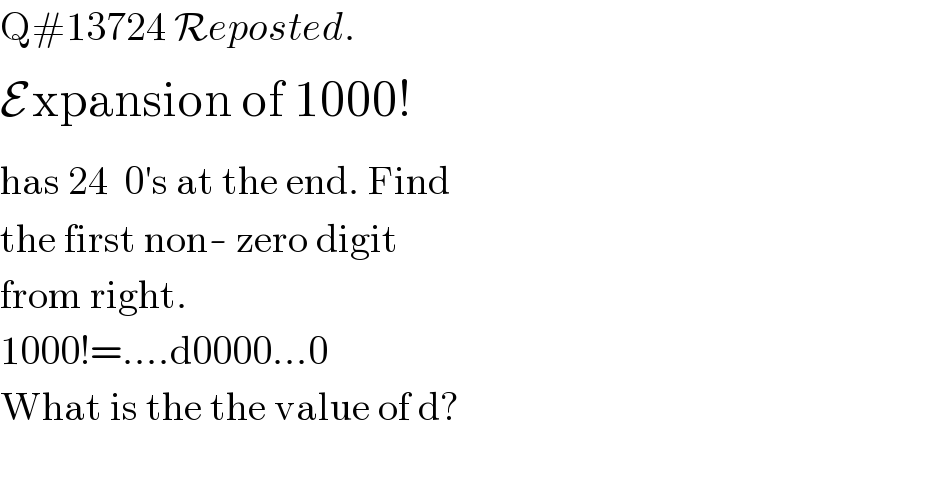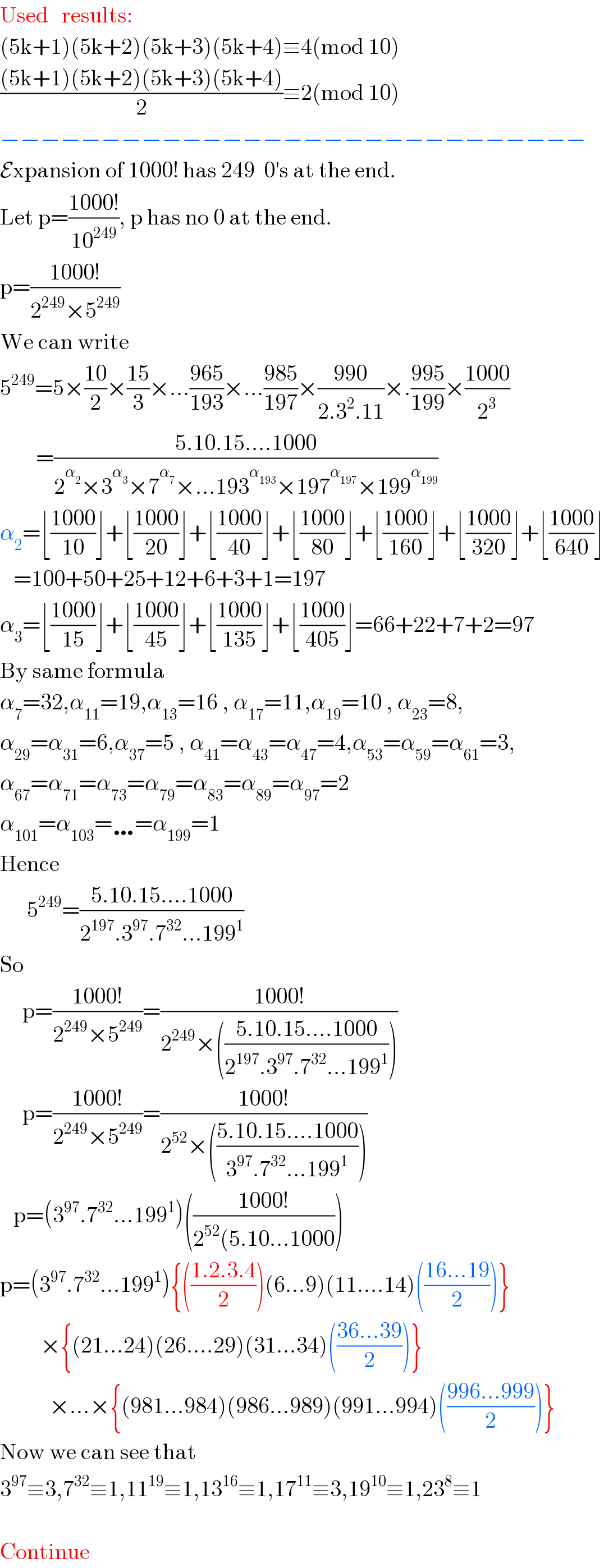
Question and Answers Forum
Question Number 15543 by RasheedSoomro last updated on 11/Jun/17

Answered by RasheedSoomro last updated on 11/Jun/17

Commented by tawa tawa last updated on 11/Jun/17

Commented by RasheedSoomro last updated on 12/Jun/17

Answered by RasheedSoomro last updated on 12/Jun/17
![NEW APPROACH_(−) (The simplest approach) Used results (5k+1)(5k+2)(5k+3)(5k+4)≡4(mod 10) (((5k+1)(5k+2)(5k+3)(5k+4))/2)≡2(mod 10) 2^(4k+1) ≡2(mod 10) 4^(2k) ≡6(mod 10) −−−−−−−−−−−−−−−−−−−−−−−− Expansion of 1000! has 249 0′s at the end p=((1000!)/(10^(249) )) has no zero at the end. Let f(n)=n! f(1000)=1000!=(1...4)(5...9)...(996...999)(5.10.15...1000) =(1...4)(6...9)...(996...999).5^(200) .(1.2.3...200) =5^(200) (1...4)(6...9)...(996...999)×f(200) f(200)=(1...4)(6...9)...(196...l99)(5.10...200) =5^(40) (1...4)(6...9)...(196...l99)(1.2...40) =5^(40) (1...4)(6...9)...(196...l99)×f(40) f(40)=(1...4)(6...9)...(36...39)(5.10...40) =5^8 (1...4)(6...9)...(36...39)(1.2...8) =5^8 (1...4)(6...9)...(36...39)×f(8) f(8)=(1.2.3.4)(5.6.7.8)(5) =5(1.2.3.4)(6.7.8) f(1000)=5^(200) (1...4)(6...9)...(996...999) ×5^(40) (1...4)(6...9)...(196...l99) ×5^8 (1...4)(6...9)...(36...39) ×5(1...4)(6.7.8) =5^(249) (1...4)^4 (6...9)^3 (6.7.8)...(36...39)^3 ×(41...44)^2 ...(196...199)^2 ×(201...204)...(996...999) p=((f(1000))/(2^(249) .5^(249) )) =((1/2^(249) ))(6.7.8)(1...4)^4 (6...9)^3 (11...14)^3 ...(36...39)^3 ×(41...44)^2 (46...49)^2 ...(196...199)^2 ×(201...204)...(996...999) ={(1...4)(6...9)...(996...999)} =(6.7.8)( =((1/2^(249) )){(1...4)...(36....39)^(8 brackets) }^3 ×{(41...44)...(196...199)^(32 brackets) }^2 ×{(201...204)...(996...999)^(180 brackets) } ×{(1...4)(6.7.8} Total number of brackets =8×3+32×2+180+2=270 Any of 249 brackets could be given 2 as denominator (((∗.∗.∗.∗)/2))≡2(mod 10) [249 congruences] (∗.∗.∗.∗)≡4(mod 10) [ 20 congruences] 6.7.8≡6(mod 10) [ 1 congruence] Multiplying above congruences p≡2^(249•) .4^(20∗) .6(mod 2) ≡2.6.6(mod 10) ≡2(mod 10](Q15581.png)
Commented by mrW1 last updated on 12/Jun/17

Commented by tawa tawa last updated on 12/Jun/17

Commented by mrW1 last updated on 12/Jun/17

Commented by RasheedSoomro last updated on 12/Jun/17

Commented by mrW1 last updated on 12/Jun/17

Commented by RasheedSoomro last updated on 12/Jun/17

